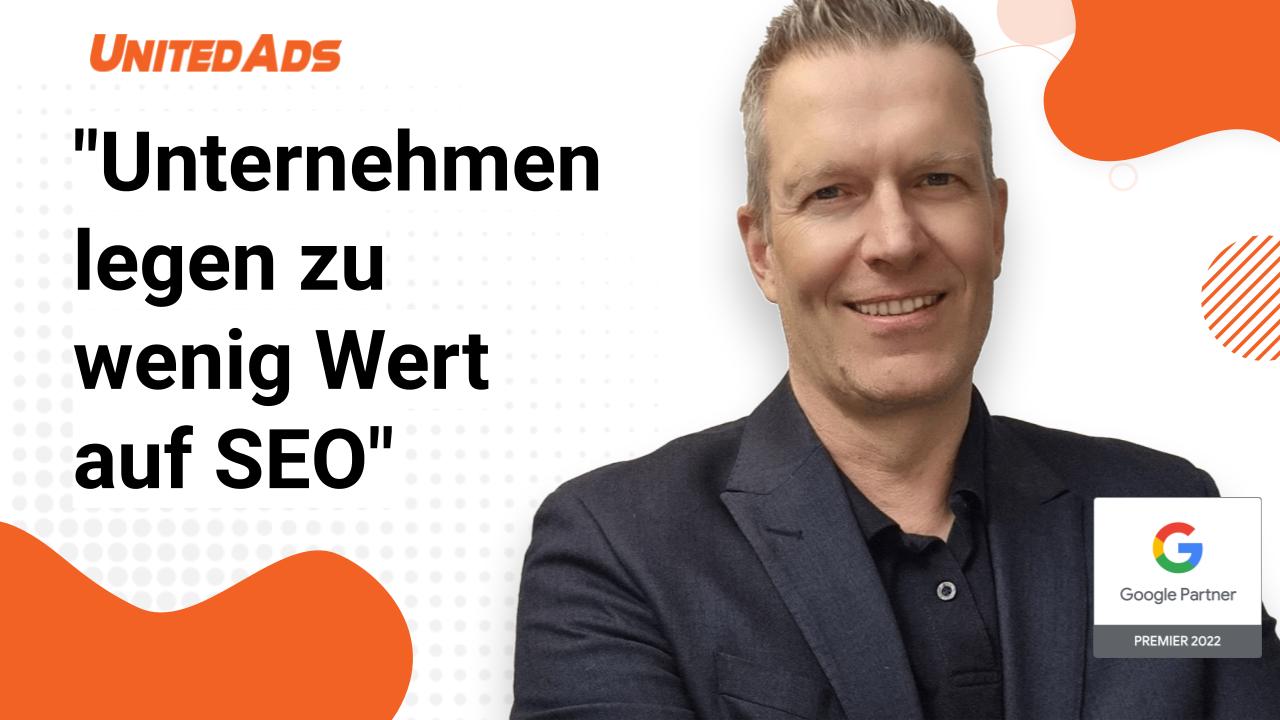UnitedAds CEO Alex Sperber on the topic of “SEO in companies
Tell us about your work – what does a typical day look like?
I don’t have a typical day; each one is different. We are a dynamic company in a still growing and rapidly changing market. My job is a combination of strategic and operational tasks.
I may be speaking at an event one day about the importance and ROI benefits of SEO. On another day, I work closely with clients and potential clients to ensure we understand and best meet their needs. And, of course, I sometimes take care of business basics like staffing, budgets and planning.
An important part of my work is to be available to our team as a discussion partner and coach. It is important to me that employees feel empowered and supported to act and make decisions in the best interests of our customers.
I don’t believe in a corporate structure where everyone has to get approval for every single decision. In such a dynamic industry, this only increases the likelihood of missed opportunities. Instead, I try to give everyone a clear area of responsibility within which they can do their work – with the ability to make decisions independently. At the same time, I encourage everyone to consult with colleagues to develop good ideas and try new approaches.
What are the values at UnitedAds and how do you motivate your team to stick to them?
Our core values are exceptional customer service and continuous improvement in the way businesses use the Google platform to achieve their goals.
The backbone of any company is its team, so we try to attract and retain the best people.
To motivate our team, we have introduced a variety of benefits, most notably a culture of “location-independent working” where our employees can make the most of remote and office working.
We also give our employees a share in the company’s success.
Do you think companies will put enough emphasis on SEO and search engine marketing in general in 2022?
Honestly, no. Although awareness of SEO is increasing, I don’t think organic search is getting the attention it deserves in most companies’ marketing mix.
Part of the problem is that SEO is seen as a largely tactical, technical discipline for specialists. The management is mostly not interested in SEO. Many marketing decision makers don’t consider SEO an adult marketing discipline. SEO is rarely discussed in boardrooms because it doesn’t have the big media budgets.
As
SEO agency
we often make life difficult for ourselves when we focus too much on SEO metrics such as individual keyword rankings that have little to do with what a company is actually trying to achieve. So, for example, more leads or more awareness.
SEO is a proven marketing channel that delivers a fantastic return on investment (ROI) – we need to focus more on this ROI of search engine optimization rather than SEO-specific metrics.
How can companies calculate the ROI of SEO?
Companies should use Google Analytics to measure the conversion rate for each goal (sales, newsletter signups, form submissions, etc.) for which they want to analyze SEO ROI.
Then each conversion must be given a value in euros. It is incredibly important to assign a value to the goals in the analysis. Without an estimated value for each conversion, it’s impossible to calculate the ROI of SEO on your website.
Most of the time, assigning a meaningful conversion value is the bottleneck. After all, a newsletter subscription has no value to begin with. That is, I need to think about what is the conversion rate of my newsletter. For e-commerce companies, it is usually much easier to calculate the SEO ROI based on concrete sales via the “organic search” channel than for B2B companies with their long lead cycles.
Why does it make sense for executives to get more involved with SEO?
SEO enables to provide a basic understanding of today’s digital audiences and their expectations. This makes SEO the perfect starting point for digital marketing executives to make a whole range of important decisions.
I believe that search data may be the largest untapped source of strategic market intelligence. When people search, it’s a clear active expression of their demand – whether they’re looking for a product or simply researching a topic. In a way, SEO is the direct look into the brain of the target group.
So, by aggregating and analyzing all searches related to your market, you can answer questions about the scope and dynamics of market demand, regional and seasonal variations, and changes in customer behavior and issues. Companies can also learn more about their competitors and important aspects of their marketing by analyzing their search and content strategies.
Search provides a vast, easily accessible and constantly updated data set that can provide important strategic insights. Most companies do not make sufficient use of this opportunity.
The Google algorithm is getting better and better, do companies actually still need manual search engine optimization?
In fact, Google and the other search engines have now refined their algorithms to the point that many of the techniques SEOs used to rely on to improve search engine visibility no longer work.
The tasks in SEO have fundamentally changed.
Improving your search performance today starts with building a comprehensive understanding of your customers and your market. Based on this, you can develop content that answers your customers’ search queries better than any other provider at every stage of the buying process. And if you can do that, Google is much more likely to show your content before the others.
In other words, SEO is more important than ever.
What role do SEO tools play in this context?
Tools play an important role in providing data to help you get a handle on the types of content your customers are looking for and provide clues on how best to optimize it to make it engaging and helpful. There are also tools that can identify and automate routine technical corrections.
But tools are not creative and I don’t think you can currently create outstandingly good content without human intervention. Your content must be noticeably superior to your competitors, and that’s only possible with the creativity, passion, and expertise of good content creators.
How can companies ensure that SEO becomes a task for the entire organization and not just something placed in the hands of specialists?
This is indeed an often difficult task. First, companies should ensure that the importance of organic search is better understood throughout the organization.
More than 50% of all purchases begin with a search. Executives and employees need to understand that how the company appears in search results is now one of the most important factors in how it is perceived by the outside world. Your search presence plays an important role in all aspects of marketing.
This concerns brand awareness, sales, the possibility to develop partnerships, up to applicant marketing and employer branding.
Next, companies need to get the message out internally that SEO success requires collaboration across the enterprise. Not just the SEO team, but everyone needs to be aware of how their role impacts search results – from web developers, product and category managers, content writers, PR professionals and marketers to user experience, customer service and community management specialists. Even the CEO can make an important contribution, e.g. by personally requesting a backlink during lectures or interviews.
In some cases, you may need to take the practical step of expanding employee job descriptions to include an element of search engine optimization.
What do you think will be the most important trends for SEO in the coming year?
As for search itself, Google will continue to improve its algorithm, especially with further advances in machine learning. Google is currently focusing on the fight against automatically generated content and fake news. This means cleanly researched, high-quality content will become even more important than it already is.
A general development over the next few years will be how SEO can support overall product and marketing strategy.
Data from organic search will be used not only for optimization rankings of the website. Rather, they will work within companies to provide a better overall understanding of their customers’ needs – by analyzing the searches they conduct.
Search data can support better decisions on questions such as “what features do we need to add to our new product?”, “when is the best time to launch?” and “what is our optimal distribution strategy?”.
The upcoming restrictions on the use of third-party cookies will also have a significant and positive impact on search engine optimization. It will likely become more difficult to optimize PPC campaigns based on user data. This does not matter for organic search. Search does not rely on this data because we have something better – intent; a stated desire to research or buy something.
In a way, this makes the search even more relevant. That’s because searches don’t target people based on assumptions about their demographics or the websites they visit – which can often be misleading. Instead, you’re targeting active intent based on the search terms you type into the search bar – whether you’re looking for a vacation or a specialty tool for installing ball bearings.
What challenges do you see for SEO agencies in the future
To remain further relevant, SEO agencies need to prioritize your strategic services. Those who only sell individual SEO measures such as link building or technical SEO will have a harder time in the future.
The role of the SEO agency will be much more focused on business strategy in the future. It’s about how SEO agencies can really drive a business forward with attributable results.
Although the tasks of SEO agencies have become more technical, the task of a good SEO agency is now also to have a comprehensive overview of the client’s business in order to know how to use the “Organic Search” channel to best achieve the client’s goals.
This requires every team member to have a comprehensive understanding of our customers’ business, a great deal of business know-how and access to relevant data. This makes the job of SEO agencies much more demanding than before.
What challenges do you see for SEO agencies in the future
To remain further relevant, SEO agencies need to prioritize your strategic services. Those who only sell individual SEO measures such as link building or technical SEO will have a harder time in the future.
The role of the
SEO agency
will be much more aligned with business strategy in the future. It’s about how SEO agencies can really drive a business forward with attributable results.
Although the tasks of SEO agencies have become more technical, the task of a good SEO agency is now also to have a comprehensive overview of the client’s business in order to know how to use the “Organic Search” channel to best achieve the client’s goals.
This requires every team member to have a comprehensive understanding of our customers’ business, a great deal of business know-how and access to relevant data. This makes the job of SEO agencies much more demanding than before.
And what’s next for UnitedAds?
Since the company’s inception over 10 years ago, UnitedAds has grown rapidly to meet the increasing needs of businesses looking to improve their marketing performance through SEO. Along the way, we must continue to hire the best people to build lasting relationships with our customers and deliver a high ROI.
At the same time, we are now focused on providing a complete solution for marketing across the entire Google platform. While we can regularly show that the ROI of SEO is better than Google Ads in the long run, it’s also true that you can get results much faster with paid search campaigns. This is of course highly relevant for many companies.






